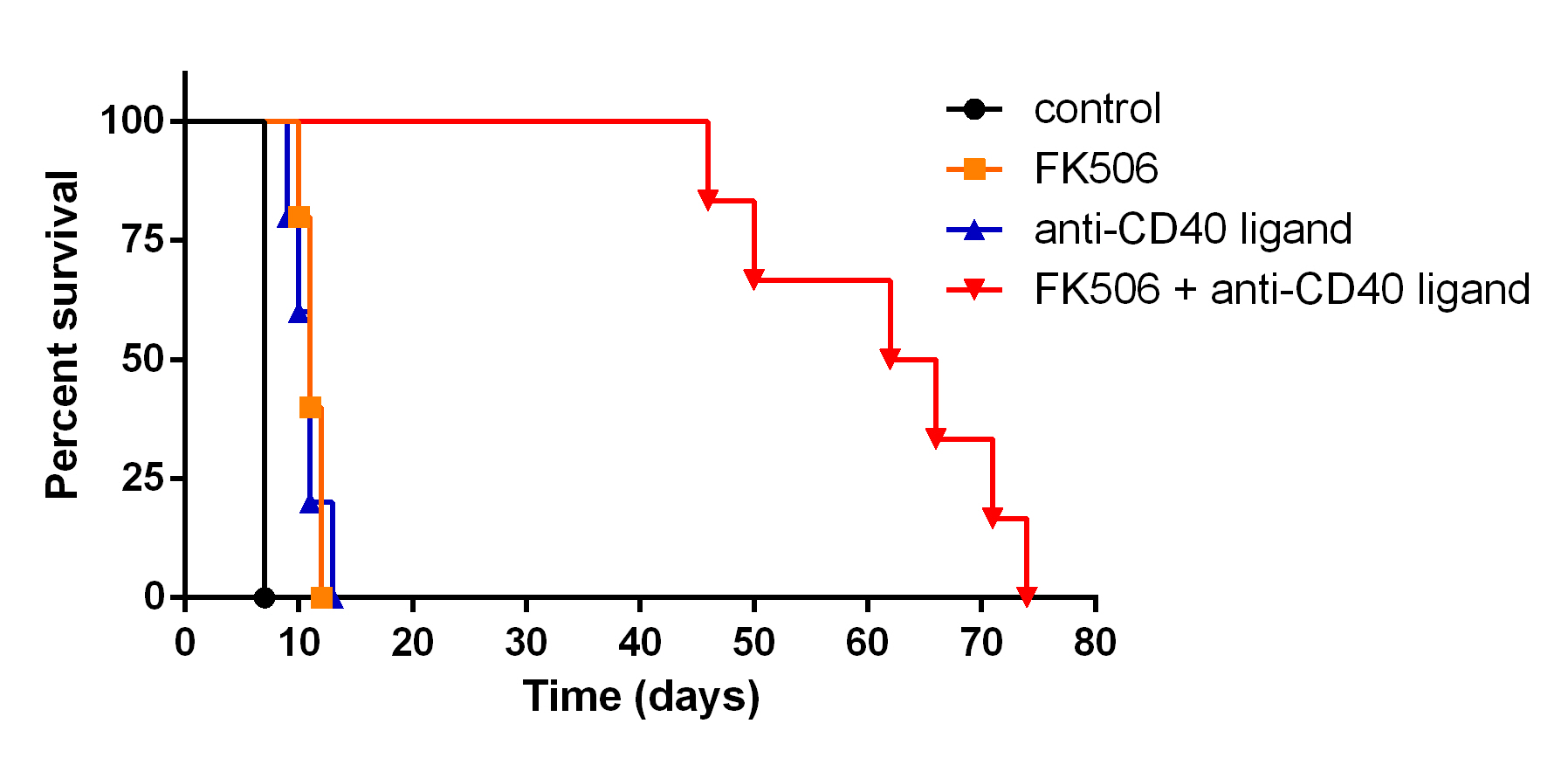Short-Term Combination Treatment of FK506 and Anti-CD40 Ligand Remarkably Prolong Allograft Survival Time in Mouse Skin Transplantation.
Institute of Organ Transplantation, Tongji Hospital, Tongji Medical College, Huazhong University of Science and Technology
Key Laboratory of Organ Transplantation, Ministry of Education
Key Laboratory of Organ Transplantation, Ministry of Health, Wuhan,
Meeting: 2017 American Transplant Congress
Abstract number: A148
Keywords: FK506, Mice, Skin transplantation, Survival
Session Information
Session Name: Poster Session A: Immunosuppression
Session Type: Poster Session
Date: Saturday, April 29, 2017
Session Time: 5:30pm-7:30pm
 Presentation Time: 5:30pm-7:30pm
Presentation Time: 5:30pm-7:30pm
Location: Hall D1
Background: It is well established that skin are more prone than kidney to rejection after transplantation and is difficult to archive allograft acceptance following normal treatment. This study was conducted to investigate the combine effect of FK506 and anti-CD40 ligand on remarkably prolonging the skin allograft survival time in mouse skin transplantation.
Methods: Full thickness skin grafts (1[times]1cm) obtained from the tail of male BALB/c (H-2d) mice and transplanted onto the dorsal flank of male c57BL/6 (B6, H-2b) mice. The grafts were inspected daily after day 7. Allograft necrosis involving the entire graft area was defined as rejection. The mice were divided into four groups: control group (n=6), FK506 group (n=5), anti-CD40 ligand group (n=5), and FK506 + anti-CD40 ligand combination therapy group (n=6). Mice were treated with FK506 (1.5 mg/kg/day) by intraperitoneal injection on pretransplant days 2 to posttransplant day 7, and subsequently on days 9, 11, 13, and 15; Or 200 [micro]g/d anti-CD40 ligand by intraperitoneal injection on the day of transplant to posttransplant day 3, and subsequently on days 7 and 14. The statistical analysis method we used was Kaplan-Meier log-rank test.
Results: All the skin allografts were rejected at day 7 in control group.  Graft survival times were significantly longer in mice treated with short-term FK506 (mean survival time [MST] = 11.2 days, P=0.002 vs control group) or anti-CD40 ligand (MST = 10.8 days, P=0.002 vs control group). Surprisingly, combination treatment of short-term FK506 and anti-CD40 ligand remarkably promoted the skin allograft survival time (MST = 61.5 days), compared with the other three groups (P=0.001 vs control group, FK506 group, or anti-CD40 ligand group).
Graft survival times were significantly longer in mice treated with short-term FK506 (mean survival time [MST] = 11.2 days, P=0.002 vs control group) or anti-CD40 ligand (MST = 10.8 days, P=0.002 vs control group). Surprisingly, combination treatment of short-term FK506 and anti-CD40 ligand remarkably promoted the skin allograft survival time (MST = 61.5 days), compared with the other three groups (P=0.001 vs control group, FK506 group, or anti-CD40 ligand group).
Conclusions: Short-term FK506 or anti-CD40 ligand alone transiently prolonged the skin allograft survival time, whereas combination treatment remarkably prolonged the survival time.
CITATION INFORMATION: Zhang X, Ding Z, Yang M, Miao Y, Yang Y, Zhou P. Short-Term Combination Treatment of FK506 and Anti-CD40 Ligand Remarkably Prolong Allograft Survival Time in Mouse Skin Transplantation. Am J Transplant. 2017;17 (suppl 3).
To cite this abstract in AMA style:
Zhang X, Ding Z, Yang M, Miao Y, Yang Y, Zhou P. Short-Term Combination Treatment of FK506 and Anti-CD40 Ligand Remarkably Prolong Allograft Survival Time in Mouse Skin Transplantation. [abstract]. Am J Transplant. 2017; 17 (suppl 3). https://atcmeetingabstracts.com/abstract/short-term-combination-treatment-of-fk506-and-anti-cd40-ligand-remarkably-prolong-allograft-survival-time-in-mouse-skin-transplantation/. Accessed February 22, 2026.« Back to 2017 American Transplant Congress
